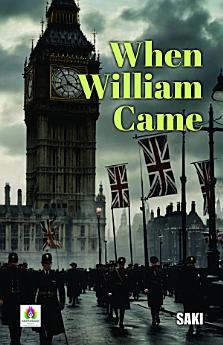When William Came
About this ebook
As the narrative develops, Saki introduces a cast of richly drawn characters each grappling with their own dilemmas and desires. At the heart of the story is a young protagonist who is initially drawn into the fervor of patriotism and heroism but gradually becomes disillusioned by the grim realities that wartime imposes on society. Through sharp dialogue and clever exchanges, Saki unveils the complexities of human nature while unveiling the often-overlooked absurdities that accompany high-stakes decisions. Readers are invited to explore not only the external conflicts that arise due to war, but also the internal strife that characters endure as they navigate love and loyalty in a time rife with uncertainty.
The magic of When William Came lies in Saki’s brilliant ability to infuse humor into the narrative while simultaneously delivering poignant social critique. His satirical lens scrutinizes British society, exposing the eccentricities and inconsistencies of its conventions — a method that evokes both laughter and reflection. Through his humor, Saki challenges readers to consider the ramifications of war on personal relationships and community dynamics, emphasizing how the absurdity of life can sometimes yield unexpected moments of clarity and connection.
The novel deftly explores themes such as the impact of conflict on individual desires, the nature of heroism, and the question of fate versus free will. Saki presents a world where the lines between courage and folly blur, leaving readers to ponder what true bravery entails. Unlike conventional narratives that glorify wartime valor, Saki crafts a story that reveals the often-overlooked struggles of ordinary people—those whose lives are irrevocably altered by forces beyond their control.
With unexpected twists and turns, When William Came captures the essence of a society on the brink, inviting readers to consider the ways in which life pushes individuals toward both folly and greatness. The story is rich with surrealist themes and character interactions that highlight class distinctions and the impact of cultural norms, rendering it a timeless commentary on human behavior.
As readers journey through the pages of this remarkable work, they are not only entertained but also prompted to reflect on the deeper implications of existence during tumultuous times. Saki’s unique storytelling approach captivates the essence of wartime existence, steering clear of glorification while embracing a more nuanced understanding of humanity. With a mix of humor, adventure, and thought-provoking insights, When William Came remains a compelling exploration of the absurdity exposed by war.
In conclusion, When William Came by Saki is a powerful portrayal of life under the shadow of conflict, enriched by sharp wit and distinctive narrative style. Is it merely a tale of war, or a broader commentary on the resilience of the human spirit? Readers are left to navigate those questions, making this work an essential reading experience for anyone intrigued by the interplay of history and individual human pursuits. Delve into Saki’s world, and discover the laughter that lurks amid despair and the beauty of human connection forged in adversity.








